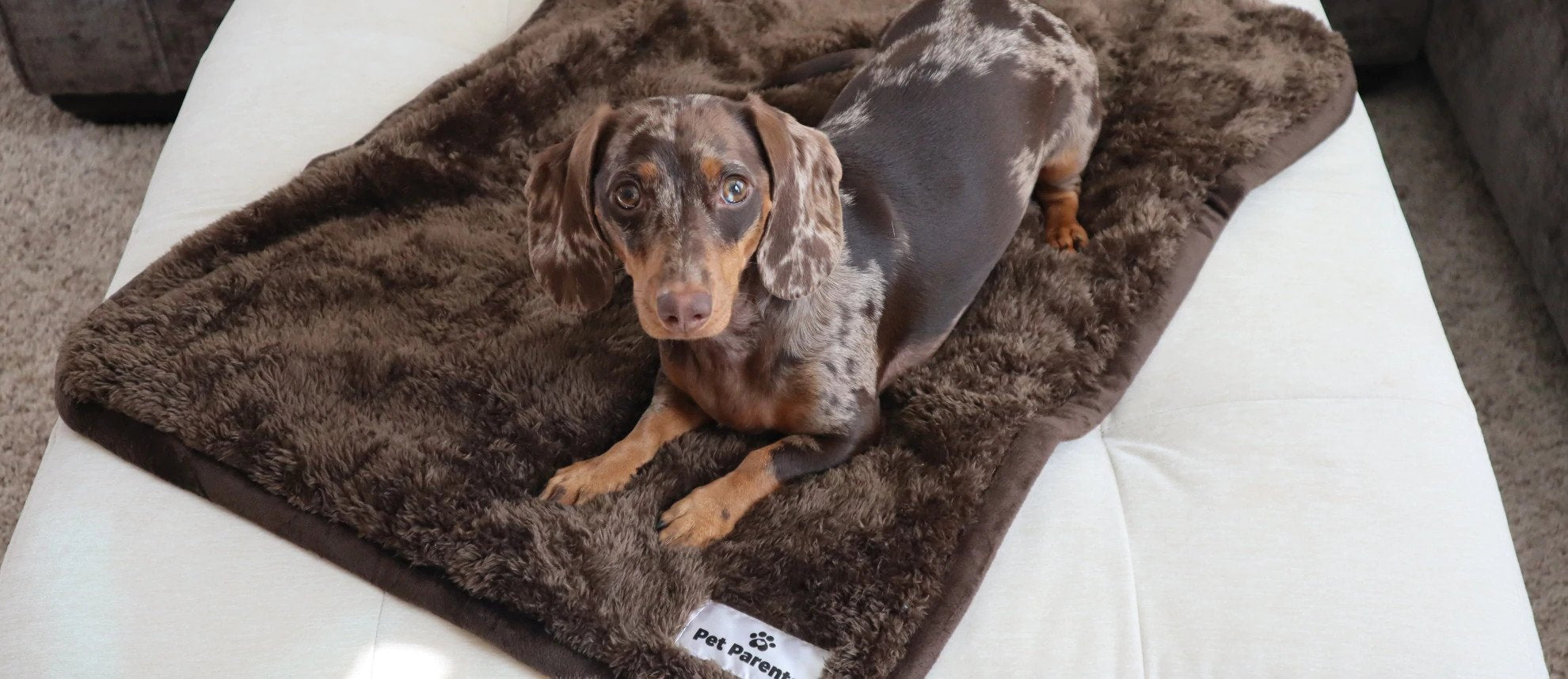"Your furbaby may be peeing on their bed because they are going through some emotional issues like anxiety, stress, grief, and even depression."
You may have noticed your furbaby’s bed getting wet with pee from time to time. But why? Why do dogs pee on beds? A dog peeing on bed could be the sign of a medical issue, emotional issue, or behavioral issue.
In this article, we’ll talk about the many possible reasons why your furbaby is peeing on their bed and dig in to what you can do to address it and keep your pet’s bed clean.
Reasons Why Your Dog Is Peeing on His Bed
Help! My dog peed on my bed. A dog may pee on their own bed or your bed. A dog peeing on bed is not a pleasant sight for any pet parent to see. But before correcting the issue, you should ask: why did my dog pee on my bed. If you have a dog peeing in sleep or while resting, that is a sign of a medical problem, like incontinence.
If your dog is peeing on on the bed while awake, you must ask yourself if he or she is fully potty trained or has been out recently. If your dog is potty trained and healthy, you might wonder, why is my dog peeing on my bed for no apparent reason. Here are some things to consider when identifying why your dog is peeing on their bed.
Emotional Distress
Your dog may be peeing on their bed because they are going through some emotional issues like anxiety, stress, grief, and even depression. The real cause of a dog peeing on bed can be an emotional issues in your furbaby, which can be caused by:
- changes in their daily routine
- changes in their surroundings
- loud noises
- traveling
- death or departure of a pet parent or pet friend
- an underlying health condition that causes depression in your dog
- the reliving of past traumas through experiences
What can you do? So, if your dog is suffering from emotional stress, what should you do? Address the issue. If your furbaby pees on their bed because of emotional issues, identify the triggers that are causing them anxiety. From there, you can do things that will comfort them and help ease their anxiousness, like taking a nice walk to the park, providing them a stress-free environment with no loud noises, and extending playtime. Extend time periods of relaxation as much as possible for your furbaby.
You can also provide your dog wetting the bed with Pet Parents® Calming SoftSupps®. These are calming supplements that will greatly aid your dog to remain calm and relaxed during stressful situations. The super ingredient, Suntheanine® is clinically studied for promoting a sense of relaxation without drowsiness.
Note: In extreme emotional issues, a veterinary evaluation is recommended to determine if your dog needs a prescription medication.
Learning to Control of Their Body Functions
This is common in puppies. Puppies are still growing and they still don’t have full control of their bodily functions, particularly their bladders and bowels.
Full control of these body parts takes time to develop and for most puppies under six months old, they cannot control their bladder for more than a few hours at a time.
What can you do? You can have your pup wear Pet Parents® Washable Dog Diapers or Pet Parents® Washable Belly Bands. These dog diapers and belly bands are made with WickQuick® proprietary fabric that absorbs liquid fast and locks them in to prevent your dog from developing urine burns and rashes. You can also make use of Pet Parents® Pawtect® Pads as added leakage protection. These products will keep your pet comfortable through this stage and your pet’s bed will stay clean.
Urinary Incontinence
Urinary incontinence is the partial or lack of ability of your dog to fully control their bladder. This can happen anytime, whether your dog is doing something or is at rest. A dog peeing in sleep is an indication of urinary incontinence. If you're wondering "why is my dog peeing on my bed when he sleeps?" it is highly likely you are encountering incontinence.

In this case, they are unable to control their bladder and end up peeing in their sleep often. Urinary incontinence may be associated with age, heredity, infections in the bladder, neurological concerns, and hormone response.
Hormone-responsive urinary incontinence is one of the most common reasons why your dog is peeing on their bed and is usually diagnosed in spayed female dogs.
This type of urinary incontinence deals with the estrogen levels of your furbaby as estrogen plays an important part in helping control the urethral sphincter (the muscle that holds pee in). When you have your dog spayed, their uterus and ovaries are removed. These organs are responsible for producing estrogen in the body. So the lesser estrogen in the body means the sphincter also loses some of its ability to hold pee in.
What can you do? If your dog pees on their bed because of incontinence, consult your vet as soon as possible. Depending on the causes of your dog’s incontinence, your vet may prescribe medications to strengthen the urinary sphincter or may perform surgery.
With incontinence, your dog will not only leak on their bed but everywhere. So, to save you the trouble of messy leaks and cleanups all over your house, you can have your furbaby wear comfortable Pet Parents® Washable Dog Diapers.
Side Effects of Medicines or Surgery
Your dog may also be peeing on their bed as a side effect of certain medications or of recent surgery. You should let your vet know if you are experiencing problems so that they can ensure there is not problem.
What can you do? Aside from contacting your vet, there's nothing much you can do about this but wait it out until the side effects of medicines or surgery are water off. But if your dog has maintenance medications for a long period, you can have them wear Pet Parents® Washable Dog Diapers that can help them with live their best life without causing a mess everywhere they go.
Dog Arthritis
An arthritic dog experiences too much joint pains especially when standing up or walking so they opt to pee wherever and whenever their urge tells them to. According to The Kennel Club, Arthritis is an inflammation of the joints and is a common problem for many dogs regardless of age. In dogs with arthritis, the cartilage within a joint change or is damaged, making it less smooth and causing the bones in the joint to rub hard against each other.
What can you do? Consult your vet on ways to manage and treat your dog’s arthritis. Also, keep an active life because staying active is good for your arthritic dog but avoid exercises that require a high level of physical activity. Don’t forget, too, to provide hip and joint supplements, like Pet Parents® Hip and Joint SoftSupps®. These supplements are a must for your arthritic dog as they contain Glucosamine and chondroitin that can help in improving better joint mobility and better joint stress recovery.
Territory Marking
It is a dog’s natural instinct to pee on things to mark them as their territory. With that being said, it is frustrating when you see your dog peeing on his bed on purpose. Dogs generally don’t pee or poop in areas where they sleep or rest most of the time. So if you got your dog a new bed, they might probably pee on it to make it feel and smell like their own or to show that they are taking ownership of it. A dog peeing on other dogs' beds is usually a clear sign of marking their territory. A dog peeing on beds is not ideal for most pet parents, especially when you have no way to wash it.
What can you do? You can have your pup wear Pet Parents® Washable Dog Diapers or Pet Parents® Washable Belly Bands. This will prevent their marking from landing in places that it shouldn’t.
With all the possible reasons why your dog pees on their bed and the many things you can do about them, you may want to consider getting your furbaby a new place to lay that is waterproof, like Pet Parents® Pawtect® Blankets. You can cover their new bed with the blanket in order to prevent any messes and have a quick wash if they do happen to mark their bed.
"It all boils down to getting your furbaby a new pet bed that is waterproof, like Pet Parents® Pawtect® Blankets."
Our Pawtect® Blankets may be used as a pet bed for your dog or placed on top of it to protect it from messes. According to the American Kennel Club, good pet beds warrant better sleep. Unlike the floor, these Pawtect® Blankets will keep your furbaby warm, may help aid arthritic joints, and prevent calluses from developing. Additionally, your furbaby can finally rest and sleep without you having to go crazy about them peeing on their blanket!
Now that you know why your dog might be peeing on his bed, you can take the steps to stop future messes! Remember to consult your vet if you have concerns about your pup’s health. A dog peeing on bed is not ideal, but there are lots of things you can do to keep your furniture and home clean. Washable and waterproof products are available so that you can avoid the mess and keep your home clean.









